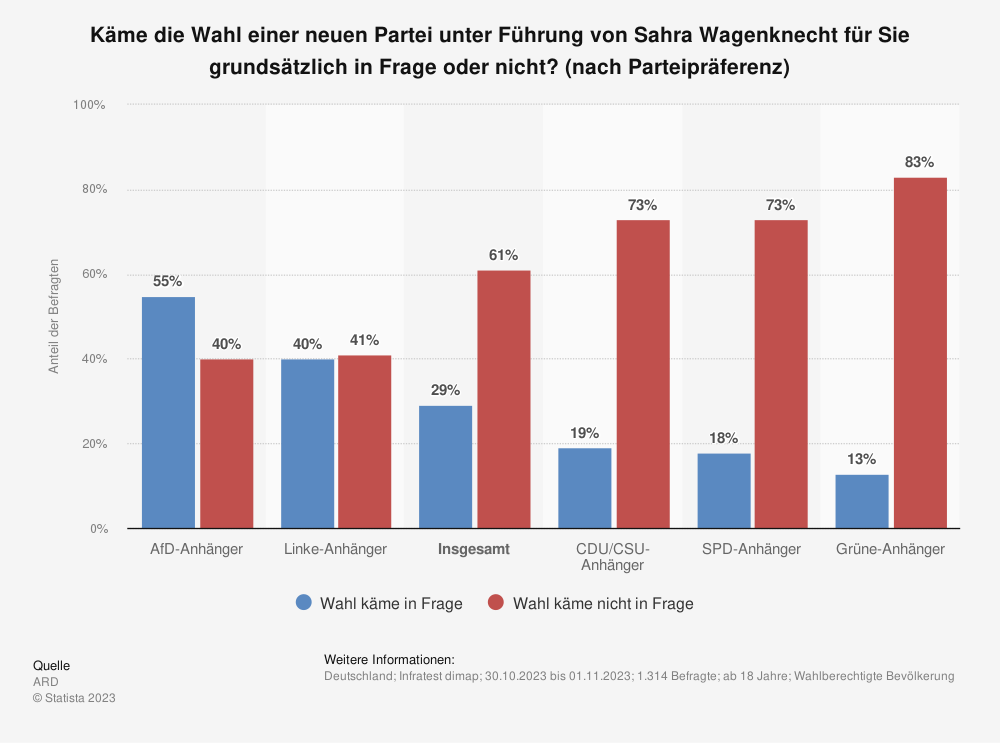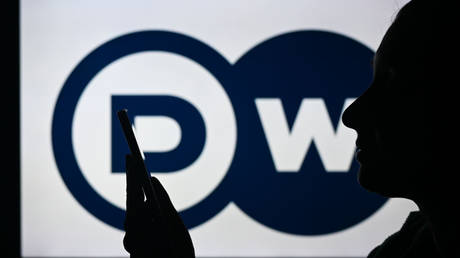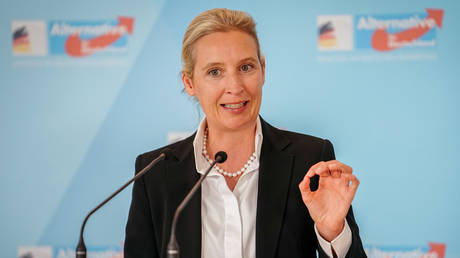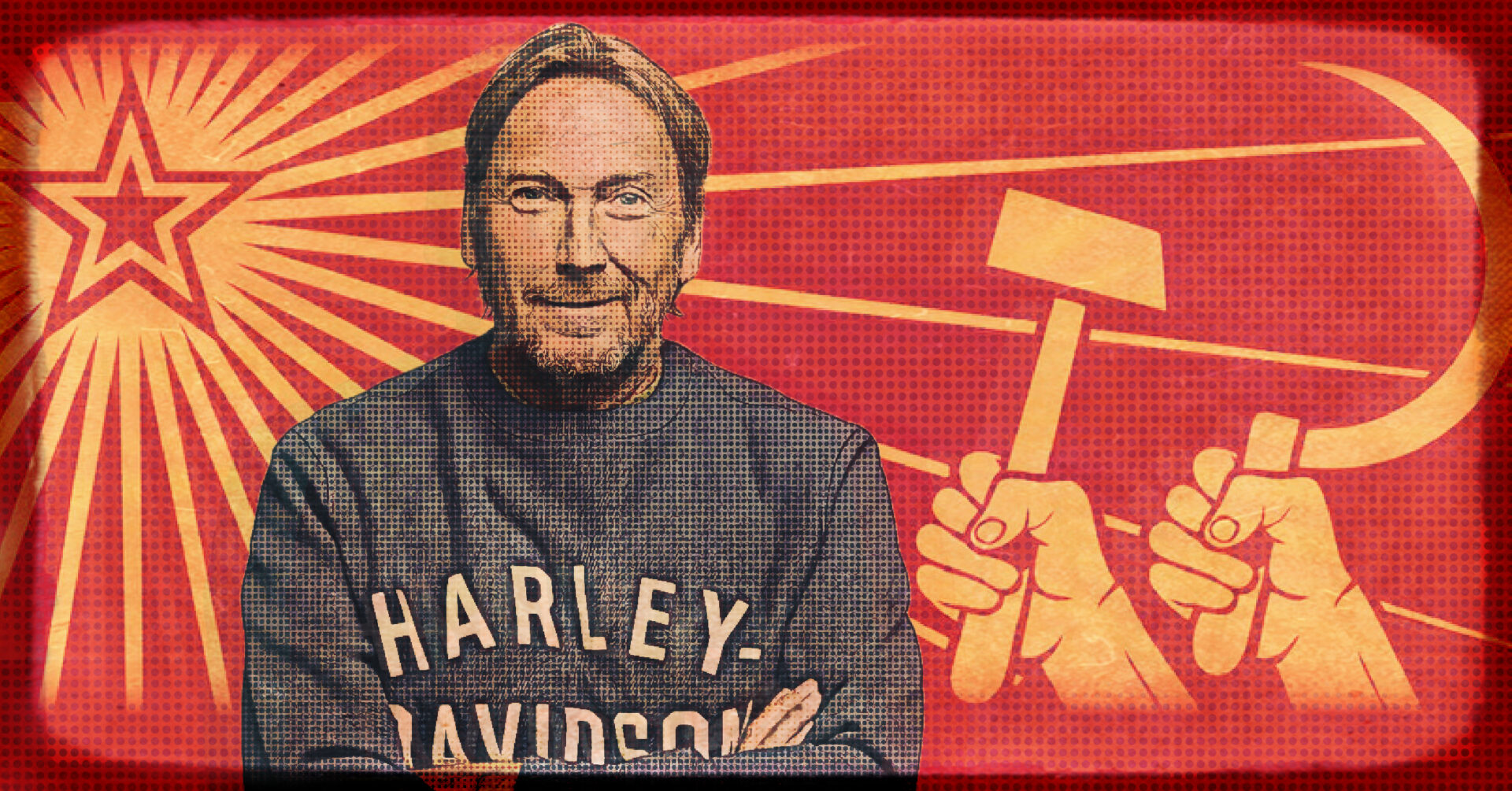Sahra Wagenknecht and Alternative for Germany: The German Right’s Dilemma
1,435 words
It is amusing in a depressing sort of way to watch the current about-turn of the German political Right regarding Sahra Wagenknecht. Wagenknecht was a well-known politician of Die Linke, the Leftist uniparty — kind of post-reunification Germany’s version of the Socialist Unity Party of Germany (SED). But in recent years she made herself rather unpopular with her comrades, to the point of being threatened with being kicked out of her own party. In 2021 Wagenknecht published a book titled Die Selbstgerechten (The Self-Righteous Ones), her criticism of the modern Left’s betrayal of its former ideals.
The mainstream press, clearly confused by its own bias, called Wagenknecht an “enigma.” Why? Because Sahra Wagenknecht said many things that the evil right-wing Alternative for Germany (AfD) was also saying. Of course, nobody stopped to think that both Wagenknecht and the AfD simply took a position that would have been squarely in the centrist camp not so many years ago. You know, common sense stuff such as that maybe unrestricted immigration is not such a good idea, or green policy is impoverishing the working and middle classes as well as destroying Germany’s industry, or getting involved in America’s endless wars for no good reason is perhaps not in the nation’s best interest. (It should be noted that both the AfD and Wagenknecht are very pro-Russian, even if only because they are tired of the United States calling the shots in Germany. But that is a whole other topic.) So of course Sahra Wagenknecht became suspect to everyone from the far Left to the so-called conservatives. She also became a heroine for many on the Right, to the point of speculation that she might join the AfD.
Personally, I respect Wagenknecht. She has sound political ideas, she is able to express herself convincingly and reasonably, and she is the one Leftist politician whom I would actually vote for. (Well, no — there is also Boris Palmer of the Green party.) But apparently, I paid better attention than others to what she was saying, because she made it very clear over the years that she had no love for the Right.
For quite a while now, rumors have circulated that Wagenknecht planned to found her own party, plans that were hailed by her fans on the Right. Now we know it’s actually going to happen. “Bündnis Sahra Wagenknecht” (Sahra Wagenknecht Alliance) is the name chosen for Germany’s newest party, and I’m still undecided whether it’s a good public relations move or sheer egocentrism. With that name, will the party even have a life beyond Wagenknecht?
If, however, AfD politicians had imagined the perfect coalition partner in Wagenknecht’s party, they were quickly robbed of that delusion. Almost the first thing Sahra Wagenknecht did was to declare her intention of luring voters away from the AfD, and her willingness to cooperate with both Die Linke and the conservative Christian Democratic Union (CDU, which is Angela Merkel’s party).
Immediately, the imaginary love affair turned sour. Having lauded Wagenknecht only weeks ago, AfD politicians and voters now attack her in the most ridiculous ways. I can’t help but think that they only have themselves to blame. Wagenknecht was always very consistent in her renunciation of the Right. People simply refused to listen.
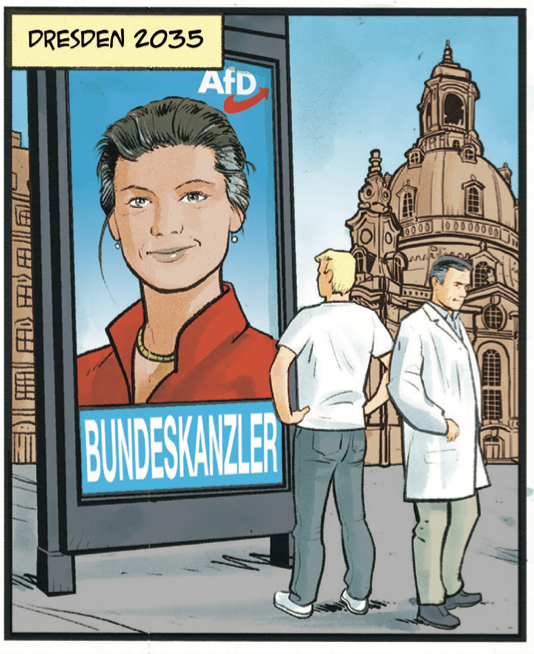
This has aged badly. From Hydra Comics no. 1 (2021)

You can buy Greg Johnson’s Toward a New Nationalism here.
How will Bündnis Sahra Wagenknecht influence the next election? I can only speculate, of course. First of all, I’m not sure how many representatives Wagenknecht’s party can actually muster. Will there be enough for party chapters on a local level?
Aside from that, however, yes, I do believe she will attract many of those potential voters who have swelled the ranks of the AfD in recent polls. They switched to the AfD because it was the only party people with any common sense could still vote for. But now that Wagenknecht promises basically the same policies without the stigma of being an “extremist” or “Nazi,” people will choose the more moderate option. (Being a former Communist somehow doesn’t count as extremist.) There will, of course, be some converts from Die Linke who, like Wagenknecht herself, are dissatisfied with modern Leftist politics, and I suspect quite a number of people who continued to vote for the established mainstream parties just because they couldn’t possibly vote for an “evil” party, as a colleague of mine once put it, will at least give Wagenknecht a try. Polls show Bündnis Sahra Wagenknecht at a potential 14% already.
The statistics are certainly interesting, though it should be considered that the poll was commissioned by ARD, a state-sponsored news outlet. It shows that AfD voters are most likely to switch to Wagenknecht’s party (55%), while voters of the Green party are least likely to do so (13%).
From the declaration of the party’s founders on why they have left Die Linke (my translation and commentary):
The conflicts of recent years have been about the political course of DIE LINKE. [Yes, they write its name in all caps. Talk about being pushy.] Time and again, we have argued that the wrong priorities and the lack of focus on social justice and peace are diluting the party’s profile. We have repeatedly warned that the focus on urban, young, activist milieus is driving away our traditional voters. Time and again, we have tried to halt the party’s decline by changing its political course. We were unsuccessful — and as a result, the party was less and less successful with voters. The history of DIE LINKE since the 2019 European elections is the history of political failure. The respective party leaderships and the officials supporting them at the state level were determined not to discuss this failure critically under any circumstances. No responsibility was taken for it, nor did any substantive consequences follow from it. Instead, those who were critical of the party leadership’s course were identified as the culprits for the results and increasingly marginalized.
Against this backdrop, we no longer see a place for our positions in the party. One example is the “Aufstand für den Frieden” [“Uprising for Peace”] in February 2023. It was the largest peace rally in almost 20 years. Tens of thousands gathered in front of the Brandenburg Gate. Although — and precisely because — around half of the population rejects the government’s military course, the country’s entire political establishment opposed the rally and defamed it. Instead of supporting us in this dispute, the leadership of DIE LINKE stood shoulder to shoulder with the other parties: It accused the rally’s organizers of being “open to the Right,” and thus provided the cue for accusations against us. . . .
What drives us: We no longer want to accept this political development. The socially devastating policy of the Ampel [literally “traffic light”, the current ruling coalition, so called because of the parties’ colors: red (SPD), yellow (FDP) and green (Die Grünen)] is costing large sections of the population their income and quality of life. German foreign policy is fueling wars instead of trying to find peaceful solutions. International conflicts are escalating; the emerging bloc is a threat to world peace and will cause massive economic upheaval. At the same time, opposition to this political development is increasingly sanctioned and pilloried in public debate. But democracy needs diversity of opinion and open debate. The government’s inability to deal with the crises of our time and the narrowing of the accepted corridor of opinion have pushed the AfD to the top. Many people simply no longer know how else to articulate their protest. In this situation, DIE LINKE no longer presents itself as a clearly recognizable opposition, but as a soft-spoken “Yes, but . . .” party. By taking this course it has sunk below the population’s perception threshold. At present, everything indicates that it will no longer be represented in the next Bundestag, while the AfD is polling at over 20%.
Frankly, the AfD won’t have a chance at implementing its politics, at least not without holding the absolute majority. Even 23%, according to some polls, would not be enough. No party in Germany, at least on the federal and probably state levels, would ever cooperate with the AfD. It would be blocked at every turn; this is simply the sad reality of things.
My hope now is that AfD politicians will get over their childish huff as quickly as possible. Sahra Wagenknecht might not be willing to work with them, but that is no reason why they should not work with her; again, their main political points are similar enough. If, by supporting Wagenknecht’s proposals, the AfD can get what it wants anyway, where is the problem? It’s called Realpolitik. Hurt feelings have no place in it.


